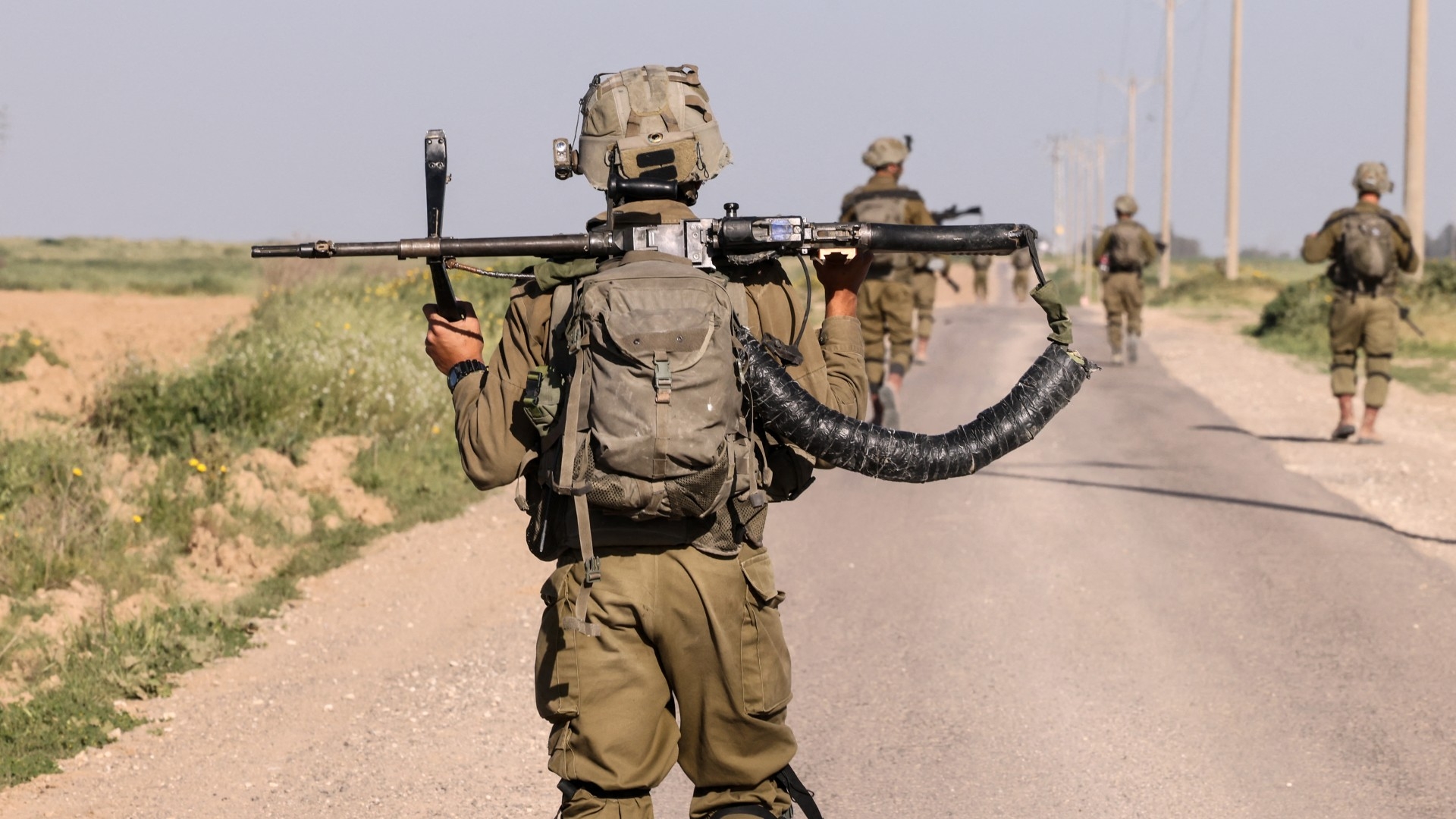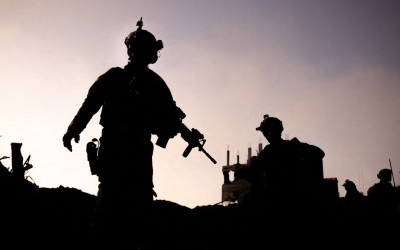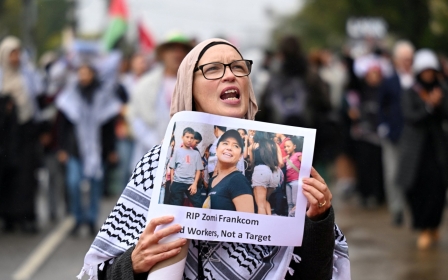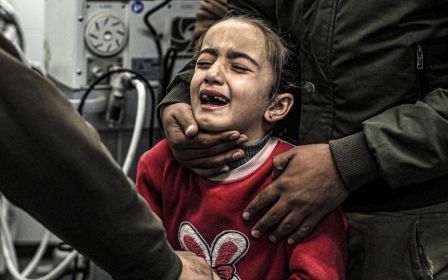War on Gaza: How Israel relies on foreign fighters to carry out its war crimes

The US recently threatened to impose sanctions on Netzah Yehuda, an Israeli army unit established around 25 years ago to integrate ultra-Orthodox men into the military.
While the prospect of sanctions against this unit might appear to be a positive development, there are concerns that the move aims to improve the overall image of the army as a law-abiding force, as Washington continues to provide financial, military and intelligence support to Israel's war machine.
As the war on Gaza has continued for more than six months, Israeli soldiers have flooded the internet with photos and videos of themselves stealing from the homes of Palestinians, wearing the lingerie of dead or displaced women, riding stolen bicycles, and boasting of attacks on civilian infrastructure. Even the army’s top lawyer concluded they had crossed a “criminal threshold”.
Since the war began last October, Israeli forces have killed more than 34,500 Palestinians, 72 percent of whom were women and children. The army’s deliberate and systematic killing of Palestinian civilians, along with the weaponisation of food and water, has few precedents in the context of modern warfare.
Even after the International Court of Justice ordered Israel to prevent acts of genocide, soldiers continued as if nothing had happened. Why?
New MEE newsletter: Jerusalem Dispatch
Sign up to get the latest insights and analysis on Israel-Palestine, alongside Turkey Unpacked and other MEE newsletters
When the Israeli army was created, terrorist Zionist organisations such as Haganah, Palmach and Irgun, among others, formed its backbone. The state of Israel was born out of large-scale terrorist operations by Zionist groups, with the aim of occupying Palestinian lands.
David Ben-Gurion, who later became Israel’s first prime minister, summed this policy up by writing in 1937: “We must expel Arabs and take their place.”
'Tremendous operation'
David Charters, a professor of military history, has asserted that Zionist terrorism in 1940s Palestine “was both tactically and strategically significant … [and] created the conditions that facilitated both the founding of Israel and the creation of an Arab-Palestinian diaspora”.
Among the atrocities committed by Zionist groups against the Palestinian people, with the aim of large-scale displacement and land seizure, was the Deir Yassin massacre.
Follow Middle East Eye's live coverage of the Israel-Palestine war
In the 2017 documentary Born in Deir Yassin, former Haganah member Meir Pail detailed how Zionist militias massacred Palestinian civilians, including women and children. In one of the historical documents revealed in the documentary, Yehuda Feder, a member of the Lehi paramilitary group, boasted proudly of executing girls with a machine gun and looting their village: “This was a really tremendous operation, and it is with reason that the left is vilifying us again.”
All these categories of foreign fighters enjoy full impunity, which perhaps explains why some have been behaving in such a cruel, reckless manner
Like tens of thousands of Zionists who came to Palestine as refugees from Europe and elsewhere, Feder was a Jew from Poland. After Lehi was dismantled, he joined the Israeli army, and from 1986-94, he served as chairman of the Likud branch in Jerusalem.
In April 2001, he was reportedly given the “Jerusalem Notable Citizen” award. This is just one example of foreign terrorist fighters who created the Israeli army later being rewarded for their massacres.
The longstanding practice of absorbing foreign fighters is still active in the Israeli army today, including a significant American component. According to the Israeli army, more than 23,000 US citizens currently serve in Israeli ranks; in fact around 10 percent of the army’s fatal casualties since the invasion of Gaza have reportedly been American.
Last December, a French lawmaker revealed that more than 4,000 French citizens have been embedded in the Israeli army during the war in Gaza. There are also reportedly up to 1,000 Australians, 1,000 Italians and 400 Indians. Britain, Germany, Canada, Russia, Ukraine, Finland and South Africa, among others, also constitute a source of foreign fighters for Israel.
Ideological indoctrination
In addition, the army recruits volunteers to assist with tasks such as packing medical supplies and preparing combat meals, with organisations like Sar-El bringing in thousands of volunteers from dozens of countries worldwide. The minimum age for volunteering is 16.
Such programmes expose volunteers to ideological indoctrination, aiming to strengthen the bond between them, Israel and its army.
Another programme to enlist foreign volunteers, Mahal, was initially founded decades ago when volunteers from around the world came to help the Haganah, and later the Israeli army. In addition, the Lone Soldiers programme provides support for “highly motivated” fighters who have no family in Israel. So-called lone soldiers, of whom there are more than 7,000, earn twice the regular monthly salary. According to Israeli army estimates, 35 percent of them are from the US. In 2020, nine percent of the 'lone soldiers' in the Israeli military were from Canada.
The most controversial category of foreign recruits, however, are mercenaries hired through contractors. There have been reports of mercenaries fighting in the Gaza war, including videos and images suggesting that American mercenaries have been operating alongside the Israeli army.
Just like Israeli soldiers, all these categories of foreign fighters enjoy full impunity, which perhaps explains why some have been behaving in such a cruel and reckless manner, bragging about their crimes online and publishing evidence of them violating various rules of war.
Indeed, despite widespread protests against such activities, only South Africa has expressed a serious willingness to pursue criminal penalties.
In previous cases, nationals of western countries who travelled to fight against the regime of Syrian President Bashar al-Assad, for example, were investigated, penalised, criminalised, and jailed, even if their activities were limited to fundraising rather than actual combat operations against the Assad forces.
Beyond the obvious double standards applied here, the impunity granted for foreign fighters joining the Israeli army will result in severe consequences for the Palestinian civilians if these fighters remain and for internal security back home if they return to their country of origin.
The situation risks motivating those foreign fighters to be further involved in unethical, illegal, and criminal activities. This could include participating in combat operations that result in killing more civilians, being stationed in occupied territories, living in settlements, or participating in the ongoing genocidal war against the Palestinian people.
The views expressed in this article belong to the author and do not necessarily reflect the editorial policy of Middle East Eye.
This article is available in French on Middle East Eye French edition.
Middle East Eye delivers independent and unrivalled coverage and analysis of the Middle East, North Africa and beyond. To learn more about republishing this content and the associated fees, please fill out this form. More about MEE can be found here.





